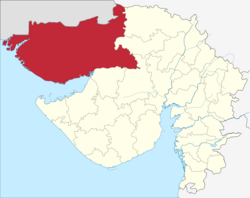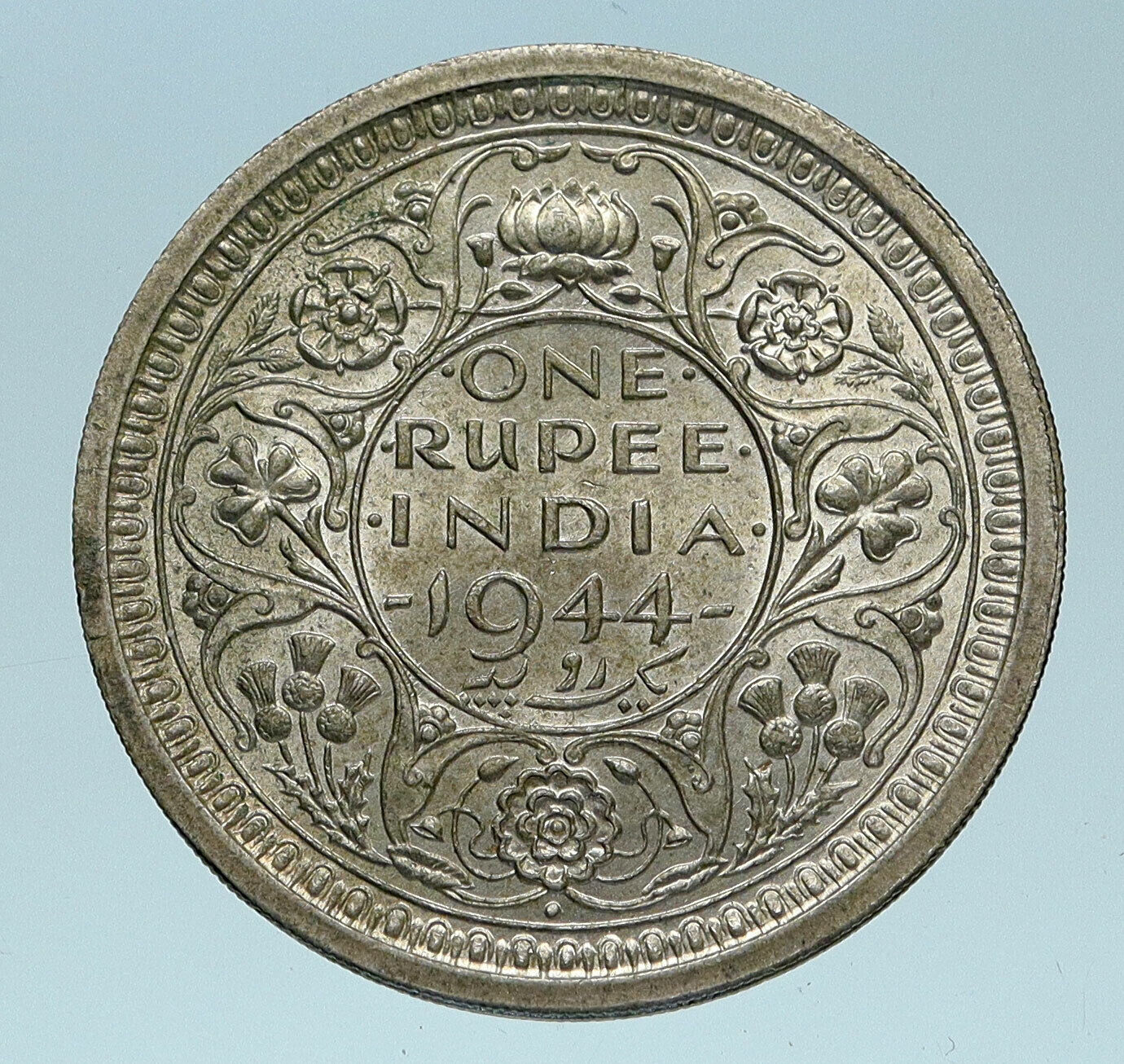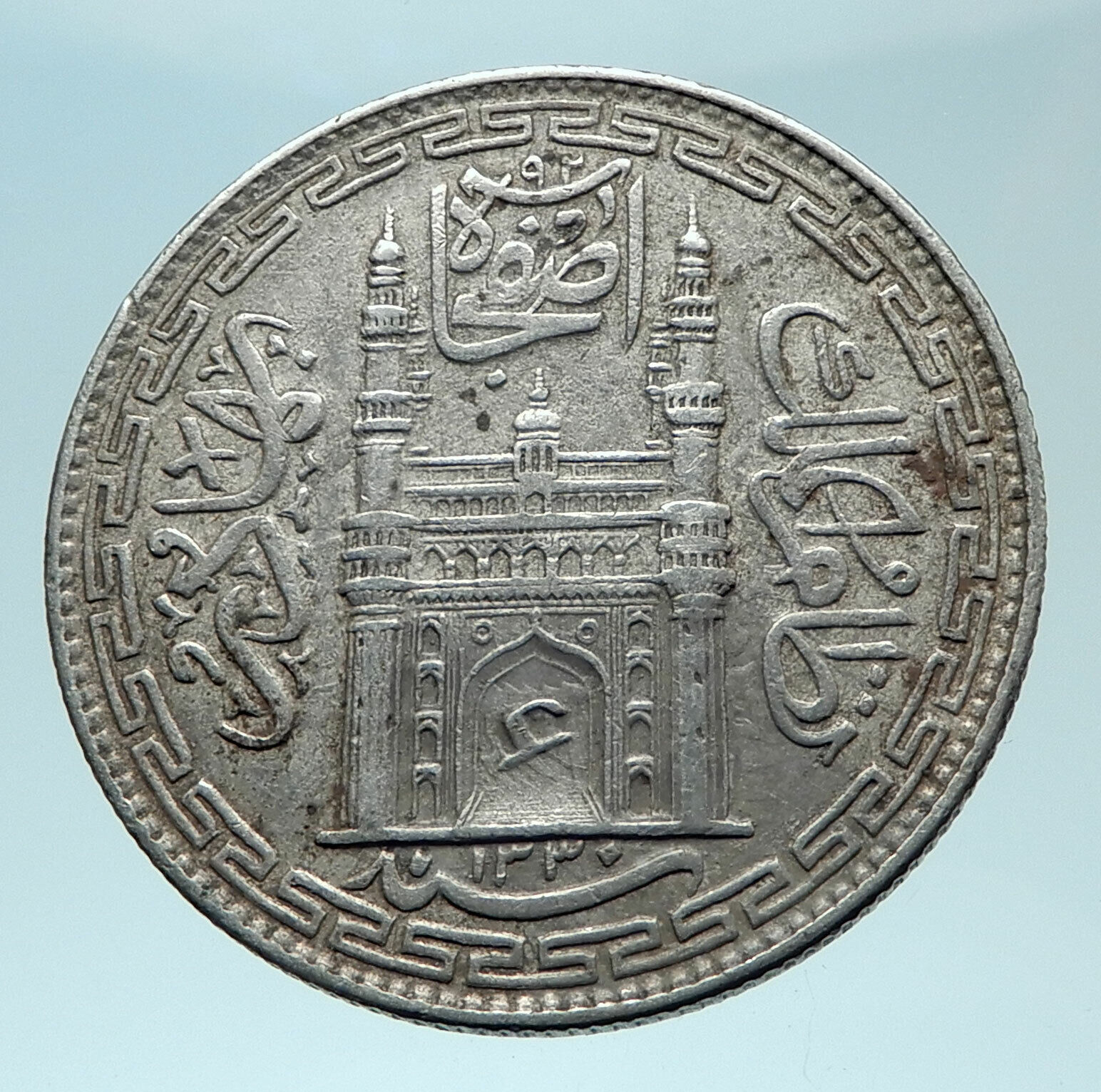|
India – Princely States. Kutch under Edward VIII – Emperor 20 January 1936 – 11 December 1936
1936 / VS1993 Silver 5 Kori 31mm (13.88 grams) 0.937 Silver (0.4178 oz. ASW)
Reference: Y# 67
महाराजा धिराज मिरजां महाराउ श्री खेंगारजी सवाई बहादुर कोरी पांच कच्छ भुज १९९३ , Trident, Crescent, Dagger Within circle, legend in Devnagari:”Kori Paanch/Kutch Bhuj/VS date Outside circle in Devnagari:”Maharaja Dhiraj Mirza Maharao Shri Khengarji Sawai Bahadur” all within a circle of beads.
ايدورد ٨ قيصر هند ضرب بهوج ١٩٣٦ , Legend in Urdu:”Edward VIII Kaisar Hind, Zarb Bhuj, AD date
Edge Lettering: * KUTCH * कच्छ * BHUJ ** भुज **
You are bidding on the exact item pictured, provided with a Certificate of Authenticity and Lifetime Guarantee of Authenticity.
.jpg/220px-HRH_The_Prince_of_Wales_No_4_(HS85-10-36416).jpg) Edward VIII (Edward Albert Christian George Andrew Patrick David; 23 June 1894 – 28 May 1972) was King of the United Kingdom and the Dominions of the British Empire, and Emperor of India, from 20 January 1936 until his abdication on 11 December of that year. Edward VIII (Edward Albert Christian George Andrew Patrick David; 23 June 1894 – 28 May 1972) was King of the United Kingdom and the Dominions of the British Empire, and Emperor of India, from 20 January 1936 until his abdication on 11 December of that year.
Edward was born during the reign of his great-grandmother Queen Victoria as the eldest child of the Duke and Duchess of York, later King George V and Queen Mary. He was created Prince of Wales on his sixteenth birthday, nine weeks after his father succeeded as king. As a young man, Edward served in the British Army during the First World War and undertook several overseas tours on behalf of his father. While Prince of Wales, he engaged in a series of affairs that worried his father and the British Prime Minister, Stanley Baldwin.
Edward became king on his father’s death. However, he showed impatience with court protocol, and caused concern among politicians by his apparent disregard for established constitutional conventions. Only months into his reign, he caused a constitutional crisis by proposing to Wallis Simpson, an American who had divorced her first husband and was seeking a divorce from her second. The prime ministers of the United Kingdom and the Dominions opposed the marriage, arguing a divorced woman with two living ex-husbands was politically and socially unacceptable as a prospective queen consort. Additionally, such a marriage would have conflicted with Edward’s status as the titular head of the Church of England, which at the time disapproved of remarriage after divorce if a former spouse was still alive. Edward knew the Baldwin government would resign if the marriage went ahead, which could have forced a general election and would have ruined his status as a politically neutral constitutional monarch. When it became apparent he could not marry Wallis and remain on the throne, he abdicated. He was succeeded by his younger brother, George VI. With a reign of 326 days, Edward is one of the shortest-reigning monarchs in British history.
After his abdication, Edward was created Duke of Windsor. He married Wallis in France on 3 June 1937, after her second divorce became final. Later that year, the couple toured Germany. During the Second World War, Edward was at first stationed with the British Military Mission to France, but after private accusations that he was a Nazi sympathiser, he was appointed Governor of the Bahamas. After the war, Edward spent the rest of his life in retirement in France. He and Wallis remained married until his death.
 Kutch district (also spelled as Kachchh) is a district of Gujarat state in western India. Covering an area of 45,674 km², it is the largest district of India. The population of Kutch is about 2,092,000. It has 10 Talukas, 1389 villages and 6 Municipalities. The Kutch district is home to the Kutchi people who speak the Kutchi language. Kutch district (also spelled as Kachchh) is a district of Gujarat state in western India. Covering an area of 45,674 km², it is the largest district of India. The population of Kutch is about 2,092,000. It has 10 Talukas, 1389 villages and 6 Municipalities. The Kutch district is home to the Kutchi people who speak the Kutchi language.
Kutch literally means something which intermittently becomes wet and dry; a large part of this district is known as Rann of Kutch which is shallow wetland which submerges in water during the rainy season and becomes dry during other seasons. The same word is also used in Sanskrit origin for a tortoise. The Rann is famous for its marshy salt flats which become snow white after the shallow water dries up each season before the monsoon rains.
The district is also famous for ecologically important Banni grasslands with their seasonal marshy wetlands which form the outer belt of the Rann of Kutch.
Kutch District is surrounded by the Gulf of Kutch and the Arabian Sea in south and west, while northern and eastern parts are surrounded by the Great and Little Rann (seasonal wetlands) of Kutch. When there were not many dams built on its rivers, the Rann of Kutch remained wetlands for a large part of the year. Even today, the region remains wet for a significant part of year. The district had a population of 2,092,379 as of 2011 census, of which 30% were urban. Motor vehicles registered in Kutch district have their registration Number starting with GJ-12. The district is well connected by road, rail and air. There are four airports in the district: Naliya, Kandla, Mundra, and Bhuj. Bhuj is well connected with Mumbai airport. Being a border district, Kutch has both an army and an airforce base.
|





.jpg/220px-HRH_The_Prince_of_Wales_No_4_(HS85-10-36416).jpg) Edward VIII (Edward Albert Christian George Andrew Patrick David; 23 June 1894 – 28 May 1972) was King of the United Kingdom and the Dominions of the British Empire, and Emperor of India, from 20 January 1936 until his abdication on 11 December of that year.
Edward VIII (Edward Albert Christian George Andrew Patrick David; 23 June 1894 – 28 May 1972) was King of the United Kingdom and the Dominions of the British Empire, and Emperor of India, from 20 January 1936 until his abdication on 11 December of that year.  Kutch district (also spelled as Kachchh) is a district of Gujarat state in western India. Covering an area of 45,674 km², it is the largest district of India. The population of Kutch is about 2,092,000. It has 10 Talukas, 1389 villages and 6 Municipalities. The Kutch district is home to the Kutchi people who speak the Kutchi language.
Kutch district (also spelled as Kachchh) is a district of Gujarat state in western India. Covering an area of 45,674 km², it is the largest district of India. The population of Kutch is about 2,092,000. It has 10 Talukas, 1389 villages and 6 Municipalities. The Kutch district is home to the Kutchi people who speak the Kutchi language. 




